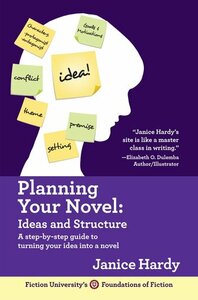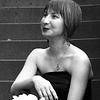Take a photo of a barcode or cover
I was looking for a workbook-style book about planning a novel. I saw another of Hardy's books mentioned on Diane Callahan's YouTube channel, and, when I looked up that book, I found this one too, so I thought I'd give it a try.
I found it very helpful. It breaks the steps down into small chunks, and you can spend a while going through it from start to finish, or you can jump around, depending on which parts you need.
I thought this was good for helping you get to grips with a novel project, whether you're a planner or not. You can do as much as you want as regards planning, but the book helps you figure out key things like the idea, the premise, the plot, the characters, and so on. You can really work it to suit you. There's lots of brainstorming ideas and exercises to help you build up your idea.
The one thing I found was that I would do the brainstorming, and then the exercises, but the exercises then felt repetitive. I think that's maybe because I had clearer ideas about the story, and I was putting all that into the brainstorming, so the exercises were sometimes superfluous. But I can see how, if you really have no idea what you want your story to be (or what it wants to be, because, let's face it, stories have a will of their own sometimes), you might find it helpful to do all the tasks. If you're clearer on your idea, like I was, then you might want to skip brainstorming and go to the exercises. The great thing is, you can use the book how you want.
Hardy has a great way of explaining all the pieces that go into a story without being prescriptive. I will definitely use this book again for a future project.
I found it very helpful. It breaks the steps down into small chunks, and you can spend a while going through it from start to finish, or you can jump around, depending on which parts you need.
I thought this was good for helping you get to grips with a novel project, whether you're a planner or not. You can do as much as you want as regards planning, but the book helps you figure out key things like the idea, the premise, the plot, the characters, and so on. You can really work it to suit you. There's lots of brainstorming ideas and exercises to help you build up your idea.
The one thing I found was that I would do the brainstorming, and then the exercises, but the exercises then felt repetitive. I think that's maybe because I had clearer ideas about the story, and I was putting all that into the brainstorming, so the exercises were sometimes superfluous. But I can see how, if you really have no idea what you want your story to be (or what it wants to be, because, let's face it, stories have a will of their own sometimes), you might find it helpful to do all the tasks. If you're clearer on your idea, like I was, then you might want to skip brainstorming and go to the exercises. The great thing is, you can use the book how you want.
Hardy has a great way of explaining all the pieces that go into a story without being prescriptive. I will definitely use this book again for a future project.
informative
reflective
medium-paced
informative
medium-paced
informative
inspiring
I have read a ton of writing books, and this one is excellent. It doesn't even take for granted what stage your book idea is at: Do you want to write but don’t have an idea? Or you have a vague idea, but don't know how to develop it? And then she helps you move to the next stage. How do you get an idea if you don’t have one? How do you develop an idea into a premise? Or take a story premise and create a book outline? Or, decide how much of a book outline you need versus how much of your book you want to discovery write?
This is how you avoid staring at a blank page, or getting stuck after 50 pages, or in my case, writing an entire novel draft only to find that it doesn’t work, and I can’t figure out why…
At every stage she acknowledges that there are multiple different ways to do things, no one right way to write a book. This is very refreshing. By the end, if you do all the exercises, you have a detailed synopsis or a basic outline of major plot points, which is a comfort for a writer like me. Or, if you want to discovery write, you can stop before you get to the final workshop. Stop when you feel ready to writing, then come back and do workshop 10 when you are revising and need to figure out structure.
The discussion of POV and narrative distance is particularly good. Nice and clear with examples. Many writing books don’t tackle narrative distance, and those that do, sometimes make it sound “hard” or advanced.
As a long time follower of Hardy's Fiction University blog, can I just add that... we got to see the end of the Bob and Sally zombie story, which she has used as a goofy plotting example for years. LOL
The discussion of POV and narrative distance is particularly good. Nice and clear with examples. Many writing books don’t tackle narrative distance, and those that do, sometimes make it sound “hard” or advanced.
As a long time follower of Hardy's Fiction University blog, can I just add that... we got to see the end of the Bob and Sally zombie story, which she has used as a goofy plotting example for years. LOL
I finally finished working through this book and it has been invaluable. So much was missing from my initial drafts that I had no clue was a problem before this. The brainstorm activities are highly helpful, and I recommend this to anyone who wants to write a novel but has no idea how to go about it. Janice Hardy clearly walks you through every single step for planning a compelling story. Tell me how it works for you!
More of a work-through-as-useful-for-a-project rather than a read-from-cover-to-cover book; I've worked through it on a couple of projects now - a revision and a new concept - and I'm impressed with its versatility and usefulness. There's a lot to offer both planners and pantsers - the former in building before writing, and the latter in regrouping for efficient revisions - in terms of pragmatic approaches to solid fiction concepts that will give strong bones to a project.
I'll write a review on this later, but honestly - one of the best writing guides I've picked up in quite some time. It's easy to understand, comprehensive with the different types of writers as well as writing for working on a project - just a lot of good stuff here. Review to come. :)





